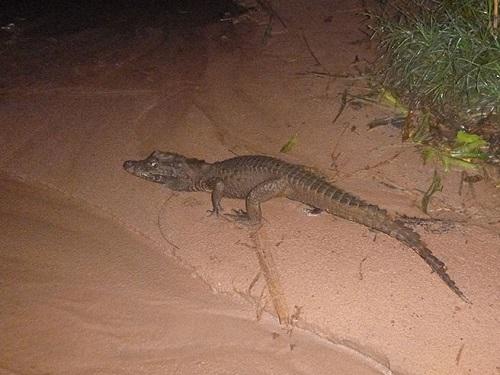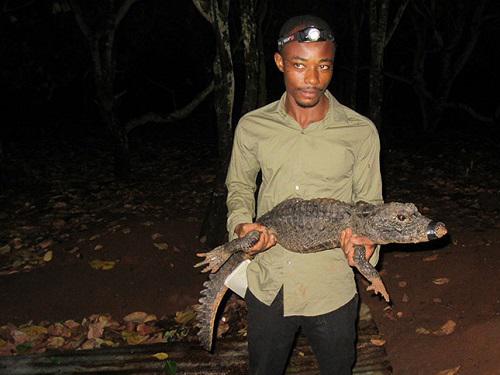Emmanuel Amoah
Other projects
7 Jan 2020
Saving the Vulnerable West African Dwarf Crocodile from Local Extinction: A Community Approach in Awniafutu, Ghana II
29 Mar 2022
Safeguarding the Last Stronghold of the Critically Endangered West African Slender-Snouted Crocodile in Ghana
Anwiafutu community swamp forest is believed to harbour significant population of West African dwarf crocodile. However, even at this locality, dwarf crocodiles are heavily exploited for food and traditional medicine. Conservation and monitoring for this species is complicated by lack of population, distribution and ecological data that critically underpin management decisions. We seek to provide comprehensive data on the status of dwarf crocodiles in the forest to aid its conservation planning and management. Important outputs will include a Dwarf Crocodile Conservation Action Plan, as well as improved local knowledge and support for the species’ conservation.

West African dwarf crocodile (Osteolaemus sp. nov. cf. tetraspis).
The swamps of Anwiafutu, a fringe community of Ankasa Conservation Area is believed to harbour significant population of West African dwarf crocodile. Unfortunately, this site is outside the protected area and, despite this species being integrally protected in Ghana, crocodiles are still heavily hunted for bushmeat by the local community. Preliminary results from our surveys in the community revealed that both crocodile eggs and meat are harvested for medicine and food, respectively. It is evident that dwarf crocodile long-term persistence is unlikely unless urgent actions are taken for their conservation and/or sustainable management. We propose to conduct a thorough population census, quantify habitat threats, and engender community support for dwarf crocodile conservation through awareness campaigns.

Emmanuel Amoah holding a West African dwarf crocodile.
This work will contribute in diverse ways towards the conservation of the species. First, it will help establish baseline information on West African dwarf crocodile status at this site from which management decisions can be made and long-term monitoring can be undertaken. This is vital because currently there is no data on the status of this species in the forest, rendering these basic conservation activities impossible.
Second, this work will help document habitat-related threats to West African dwarf crocodile in this forest for the first time. Unlike government managed forest reserves, access to community-based forests is comparatively easier and, as such, illegal activities like logging, illegal fishing practices, and clear-cutting agriculture are very common. As it stands now, it is not clear the extent to which these illegal activities are affecting the dwarf crocodile habitat. Documenting these threats will put the project team, and other concerned organisations, in a good position to mitigate these threats in the future.
Finally, we will raise awareness for West African dwarf crocodile in the forest through conservation education programmes. That is, we will highlight with the communities the key threats that are rapidly driving dwarf crocodiles to local extinction, building upon our earlier community conservation work (2015-2016) to further increase local understanding about the importance of dwarf crocodiles. During the preliminary investigation, over 95% of the respondents valued this species only for bushmeat. Conservation education will help improve local understanding of the ecological importance of West African dwarf crocodile which will assist in garnering local support for the species’ conservation.